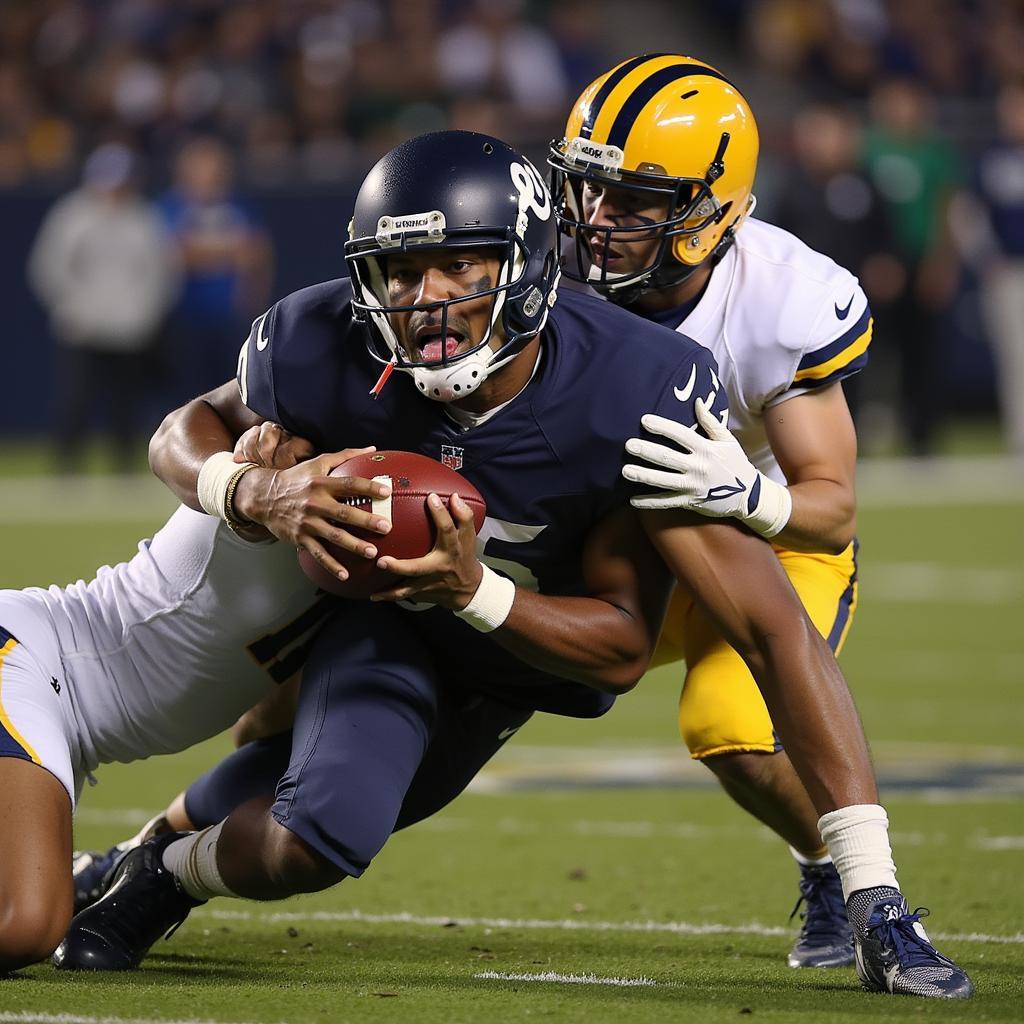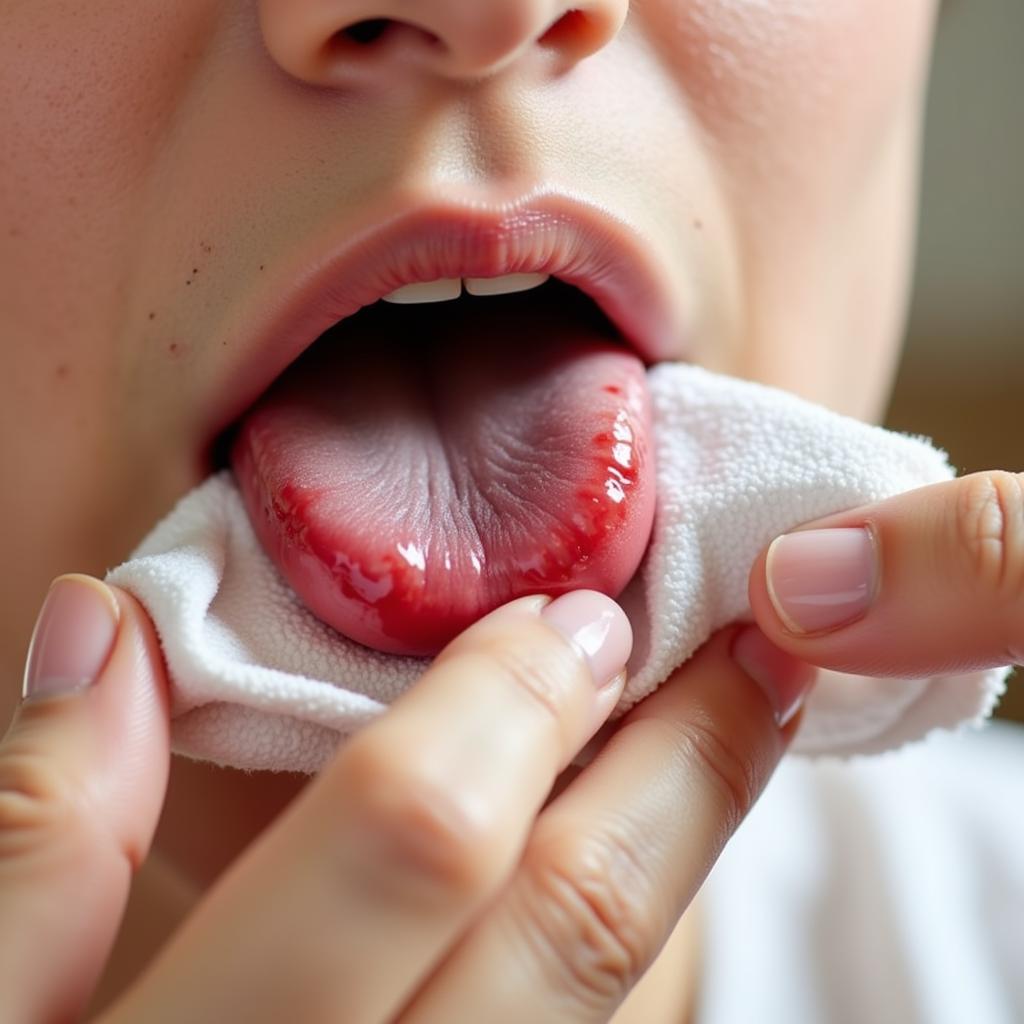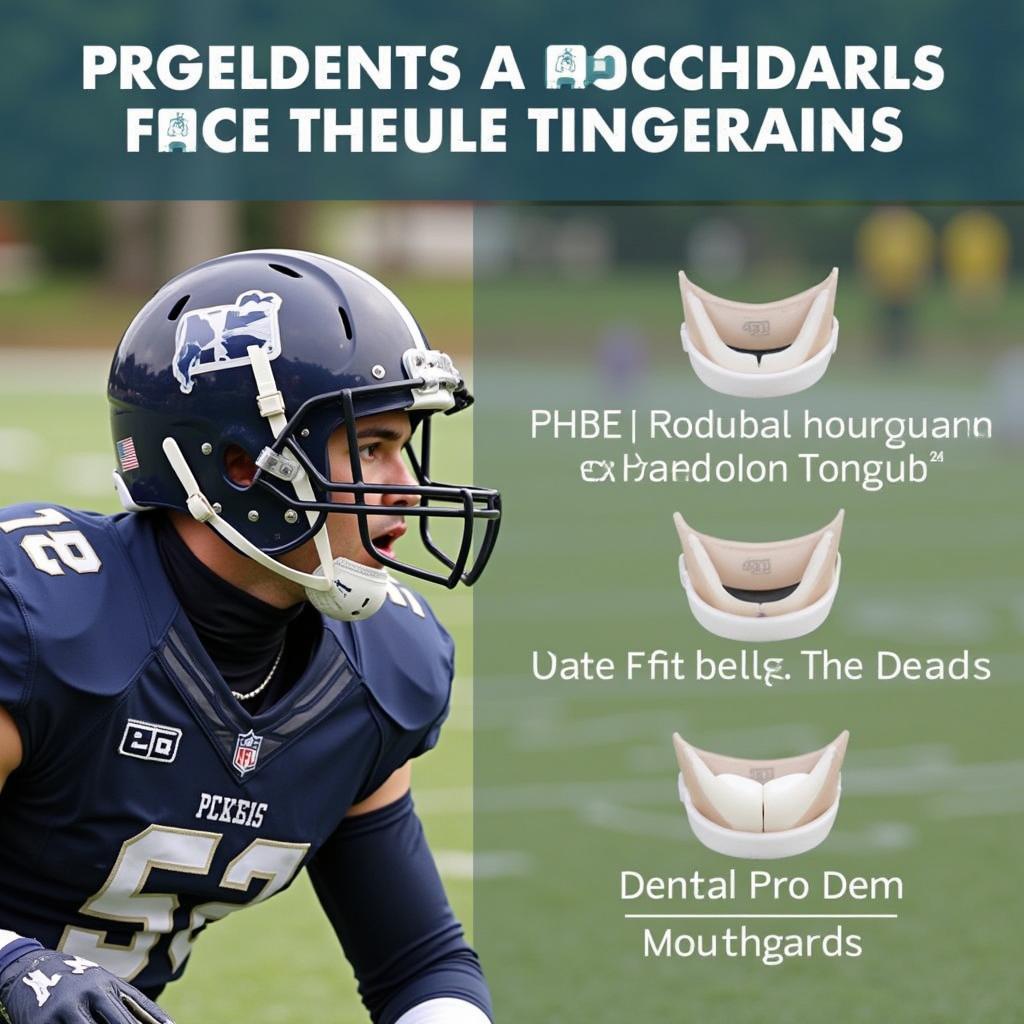Bitten Tongue: A Footballer’s Nightmare
November 8, 2024A bitten tongue is a painful and surprisingly common injury in football, sometimes referred to as the “footballer’s nightmare”. It can happen in the heat of a match, during a tackle, or even from a simple fall. This article explores the causes, symptoms, treatments, and prevention of bitten tongues in football, providing valuable insights for players, coaches, and fans.
Why Do Footballers Bite Their Tongues?
The fast-paced and physical nature of football makes players vulnerable to various injuries, including bitten tongues. A sudden impact, a collision with another player, or an awkward fall can cause the jaw to clench shut forcefully, trapping the tongue between the teeth. This can result in a painful bite, ranging from a minor nick to a severe laceration. The adrenaline pumping during a game can often mask the pain initially, leading players to continue playing until the bleeding becomes noticeable.
 Football Player Biting Tongue During Tackle
Football Player Biting Tongue During Tackle
Symptoms and Severity of a Bitten Tongue
A bitten tongue can present with a range of symptoms depending on the severity of the injury. A minor bite may cause slight bleeding and tenderness, while a deeper cut can result in significant bleeding, swelling, and difficulty speaking or eating. Some common symptoms include:
- Bleeding from the tongue
- Pain and tenderness
- Swelling
- Difficulty speaking or eating
- Numbness
First Aid and Treatment for a Bitten Tongue
Immediate first aid is crucial for a bitten tongue. Applying direct pressure to the wound with a clean cloth or gauze can help control the bleeding. Rinsing the mouth with cold water can also help clean the area and reduce swelling. For minor bites, home care may be sufficient, including over-the-counter pain relievers and avoiding spicy or acidic foods. However, deeper cuts may require medical attention, including stitches or other interventions to promote healing and prevent infection.
 Applying Pressure to a Bitten Tongue Injury
Applying Pressure to a Bitten Tongue Injury
Preventing Bitten Tongues in Football
While completely eliminating the risk is impossible, several preventative measures can reduce the likelihood of biting your tongue during football:
- Mouthguards: Wearing a properly fitted mouthguard is the most effective way to protect the tongue from being bitten during impact.
- Awareness: Being mindful of your jaw position and avoiding clenching your teeth during tackles or falls can help minimize the risk.
- Proper Technique: Developing proper tackling and falling techniques can also contribute to injury prevention.
When to Seek Medical Attention
If the bleeding is heavy and doesn’t stop after 10 minutes of direct pressure, or if the cut is deep and appears to require stitches, it’s essential to seek immediate medical attention. Signs of infection, such as increased pain, swelling, redness, or pus, also warrant a visit to a doctor.
What are the long-term effects of a severely bitten tongue?
Severe tongue bites can sometimes lead to long-term issues such as scarring, nerve damage, or changes in taste sensation.
How can I manage pain after biting my tongue?
Over-the-counter pain relievers like ibuprofen or acetaminophen can help manage pain. Cold compresses and ice chips can also provide relief.
 Football Player Wearing a Mouthguard
Football Player Wearing a Mouthguard
Conclusion
A bitten tongue, while not life-threatening, can be a painful and disruptive injury for footballers. By understanding the causes, symptoms, and preventative measures, players can minimize their risk and ensure a quicker recovery. Wearing a mouthguard is the most crucial step in preventing this common football injury. Remember, if you bite your tongue and the bleeding is severe or the cut is deep, seek immediate medical attention.
FAQs
- What should I do if I bite my tongue during a football game? Apply direct pressure to the wound and rinse your mouth with cold water.
- Is it necessary to wear a mouthguard in football? Yes, wearing a mouthguard is highly recommended to protect your teeth and tongue from injuries.
- Can a bitten tongue get infected? Yes, if not properly cleaned and cared for, a bitten tongue can become infected.
- How long does it take for a bitten tongue to heal? Healing time varies depending on the severity of the injury, but minor bites usually heal within a week or two.
- What are the signs of a serious tongue injury? Heavy bleeding, deep cuts, difficulty speaking or eating, and signs of infection are indicators of a serious tongue injury.
- Are there specific mouthguards designed for football? Yes, there are mouthguards specifically designed for contact sports like football, offering better protection.
- Can I continue playing football after biting my tongue? It’s best to stop playing and seek medical advice if the bleeding is significant or the pain is severe.
Further Reading and Related Articles
- Mouthguard Safety in Sports
- Common Football Injuries and Prevention
- First Aid for Sports Injuries
For any further assistance, please contact us at Phone Number: 0396443476, Email: [email protected] or visit us at 23 Tháng 3, Đắk Nia, Gia Nghĩa, Đắk Nông, Việt Nam. We have a 24/7 customer service team.